Grigory Malinovsky
King Abdullah University of Science and Technology
First Provable Guarantees for Practical Private FL: Beyond Restrictive Assumptions
Dec 25, 2025Abstract:Federated Learning (FL) enables collaborative training on decentralized data. Differential privacy (DP) is crucial for FL, but current private methods often rely on unrealistic assumptions (e.g., bounded gradients or heterogeneity), hindering practical application. Existing works that relax these assumptions typically neglect practical FL features, including multiple local updates and partial client participation. We introduce Fed-$α$-NormEC, the first differentially private FL framework providing provable convergence and DP guarantees under standard assumptions while fully supporting these practical features. Fed-$α$-NormE integrates local updates (full and incremental gradient steps), separate server and client stepsizes, and, crucially, partial client participation, which is essential for real-world deployment and vital for privacy amplification. Our theoretical guarantees are corroborated by experiments on private deep learning tasks.
Improved Convergence in Parameter-Agnostic Error Feedback through Momentum
Nov 18, 2025Abstract:Communication compression is essential for scalable distributed training of modern machine learning models, but it often degrades convergence due to the noise it introduces. Error Feedback (EF) mechanisms are widely adopted to mitigate this issue of distributed compression algorithms. Despite their popularity and training efficiency, existing distributed EF algorithms often require prior knowledge of problem parameters (e.g., smoothness constants) to fine-tune stepsizes. This limits their practical applicability especially in large-scale neural network training. In this paper, we study normalized error feedback algorithms that combine EF with normalized updates, various momentum variants, and parameter-agnostic, time-varying stepsizes, thus eliminating the need for problem-dependent tuning. We analyze the convergence of these algorithms for minimizing smooth functions, and establish parameter-agnostic complexity bounds that are close to the best-known bounds with carefully-tuned problem-dependent stepsizes. Specifically, we show that normalized EF21 achieve the convergence rate of near ${O}(1/T^{1/4})$ for Polyak's heavy-ball momentum, ${O}(1/T^{2/7})$ for Iterative Gradient Transport (IGT), and ${O}(1/T^{1/3})$ for STORM and Hessian-corrected momentum. Our results hold with decreasing stepsizes and small mini-batches. Finally, our empirical experiments confirm our theoretical insights.
Methods with Local Steps and Random Reshuffling for Generally Smooth Non-Convex Federated Optimization
Dec 03, 2024Abstract:Non-convex Machine Learning problems typically do not adhere to the standard smoothness assumption. Based on empirical findings, Zhang et al. (2020b) proposed a more realistic generalized $(L_0, L_1)$-smoothness assumption, though it remains largely unexplored. Many existing algorithms designed for standard smooth problems need to be revised. However, in the context of Federated Learning, only a few works address this problem but rely on additional limiting assumptions. In this paper, we address this gap in the literature: we propose and analyze new methods with local steps, partial participation of clients, and Random Reshuffling without extra restrictive assumptions beyond generalized smoothness. The proposed methods are based on the proper interplay between clients' and server's stepsizes and gradient clipping. Furthermore, we perform the first analysis of these methods under the Polyak-{\L} ojasiewicz condition. Our theory is consistent with the known results for standard smooth problems, and our experimental results support the theoretical insights.
Randomized Asymmetric Chain of LoRA: The First Meaningful Theoretical Framework for Low-Rank Adaptation
Oct 10, 2024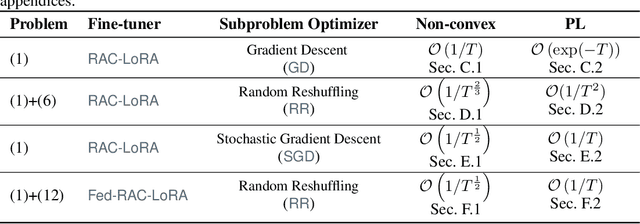
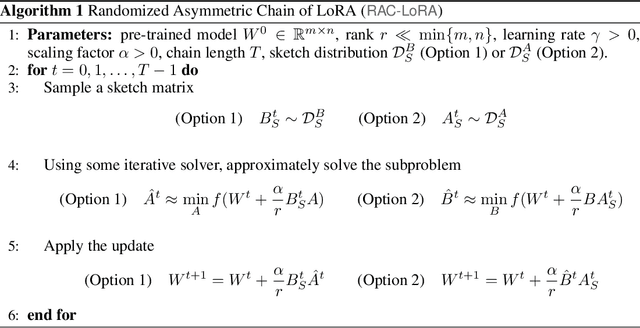
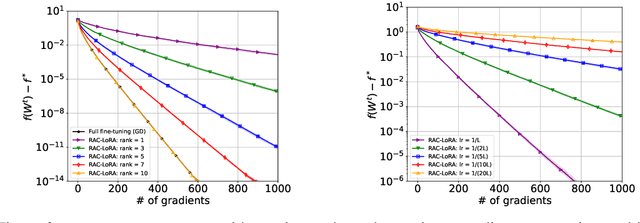

Abstract:Fine-tuning has become a popular approach to adapting large foundational models to specific tasks. As the size of models and datasets grows, parameter-efficient fine-tuning techniques are increasingly important. One of the most widely used methods is Low-Rank Adaptation (LoRA), with adaptation update expressed as the product of two low-rank matrices. While LoRA was shown to possess strong performance in fine-tuning, it often under-performs when compared to full-parameter fine-tuning (FPFT). Although many variants of LoRA have been extensively studied empirically, their theoretical optimization analysis is heavily under-explored. The starting point of our work is a demonstration that LoRA and its two extensions, Asymmetric LoRA and Chain of LoRA, indeed encounter convergence issues. To address these issues, we propose Randomized Asymmetric Chain of LoRA (RAC-LoRA) -- a general optimization framework that rigorously analyzes the convergence rates of LoRA-based methods. Our approach inherits the empirical benefits of LoRA-style heuristics, but introduces several small but important algorithmic modifications which turn it into a provably convergent method. Our framework serves as a bridge between FPFT and low-rank adaptation. We provide provable guarantees of convergence to the same solution as FPFT, along with the rate of convergence. Additionally, we present a convergence analysis for smooth, non-convex loss functions, covering gradient descent, stochastic gradient descent, and federated learning settings. Our theoretical findings are supported by experimental results.
MicroAdam: Accurate Adaptive Optimization with Low Space Overhead and Provable Convergence
May 24, 2024Abstract:We propose a new variant of the Adam optimizer [Kingma and Ba, 2014] called MICROADAM that specifically minimizes memory overheads, while maintaining theoretical convergence guarantees. We achieve this by compressing the gradient information before it is fed into the optimizer state, thereby reducing its memory footprint significantly. We control the resulting compression error via a novel instance of the classical error feedback mechanism from distributed optimization [Seide et al., 2014, Alistarh et al., 2018, Karimireddy et al., 2019] in which the error correction information is itself compressed to allow for practical memory gains. We prove that the resulting approach maintains theoretical convergence guarantees competitive to those of AMSGrad, while providing good practical performance. Specifically, we show that MICROADAM can be implemented efficiently on GPUs: on both million-scale (BERT) and billion-scale (LLaMA) models, MicroAdam provides practical convergence competitive to that of the uncompressed Adam baseline, with lower memory usage and similar running time. Our code is available at https://github.com/IST-DASLab/MicroAdam.
Streamlining in the Riemannian Realm: Efficient Riemannian Optimization with Loopless Variance Reduction
Mar 11, 2024
Abstract:In this study, we investigate stochastic optimization on Riemannian manifolds, focusing on the crucial variance reduction mechanism used in both Euclidean and Riemannian settings. Riemannian variance-reduced methods usually involve a double-loop structure, computing a full gradient at the start of each loop. Determining the optimal inner loop length is challenging in practice, as it depends on strong convexity or smoothness constants, which are often unknown or hard to estimate. Motivated by Euclidean methods, we introduce the Riemannian Loopless SVRG (R-LSVRG) and PAGE (R-PAGE) methods. These methods replace the outer loop with probabilistic gradient computation triggered by a coin flip in each iteration, ensuring simpler proofs, efficient hyperparameter selection, and sharp convergence guarantees. Using R-PAGE as a framework for non-convex Riemannian optimization, we demonstrate its applicability to various important settings. For example, we derive Riemannian MARINA (R-MARINA) for distributed settings with communication compression, providing the best theoretical communication complexity guarantees for non-convex distributed optimization over Riemannian manifolds. Experimental results support our theoretical findings.
MAST: Model-Agnostic Sparsified Training
Nov 27, 2023Abstract:We introduce a novel optimization problem formulation that departs from the conventional way of minimizing machine learning model loss as a black-box function. Unlike traditional formulations, the proposed approach explicitly incorporates an initially pre-trained model and random sketch operators, allowing for sparsification of both the model and gradient during training. We establish insightful properties of the proposed objective function and highlight its connections to the standard formulation. Furthermore, we present several variants of the Stochastic Gradient Descent (SGD) method adapted to the new problem formulation, including SGD with general sampling, a distributed version, and SGD with variance reduction techniques. We achieve tighter convergence rates and relax assumptions, bridging the gap between theoretical principles and practical applications, covering several important techniques such as Dropout and Sparse training. This work presents promising opportunities to enhance the theoretical understanding of model training through a sparsification-aware optimization approach.
Byzantine Robustness and Partial Participation Can Be Achieved Simultaneously: Just Clip Gradient Differences
Nov 23, 2023



Abstract:Distributed learning has emerged as a leading paradigm for training large machine learning models. However, in real-world scenarios, participants may be unreliable or malicious, posing a significant challenge to the integrity and accuracy of the trained models. Byzantine fault tolerance mechanisms have been proposed to address these issues, but they often assume full participation from all clients, which is not always practical due to the unavailability of some clients or communication constraints. In our work, we propose the first distributed method with client sampling and provable tolerance to Byzantine workers. The key idea behind the developed method is the use of gradient clipping to control stochastic gradient differences in recursive variance reduction. This allows us to bound the potential harm caused by Byzantine workers, even during iterations when all sampled clients are Byzantine. Furthermore, we incorporate communication compression into the method to enhance communication efficiency. Under quite general assumptions, we prove convergence rates for the proposed method that match the existing state-of-the-art (SOTA) theoretical results.
Improving Accelerated Federated Learning with Compression and Importance Sampling
Jun 05, 2023
Abstract:Federated Learning is a collaborative training framework that leverages heterogeneous data distributed across a vast number of clients. Since it is practically infeasible to request and process all clients during the aggregation step, partial participation must be supported. In this setting, the communication between the server and clients poses a major bottleneck. To reduce communication loads, there are two main approaches: compression and local steps. Recent work by Mishchenko et al. [2022] introduced the new ProxSkip method, which achieves an accelerated rate using the local steps technique. Follow-up works successfully combined local steps acceleration with partial participation [Grudzie\'n et al., 2023, Condat et al. 2023] and gradient compression [Condat et al. [2022]. In this paper, we finally present a complete method for Federated Learning that incorporates all necessary ingredients: Local Training, Compression, and Partial Participation. We obtain state-of-the-art convergence guarantees in the considered setting. Moreover, we analyze the general sampling framework for partial participation and derive an importance sampling scheme, which leads to even better performance. We experimentally demonstrate the advantages of the proposed method in practice.
A Guide Through the Zoo of Biased SGD
May 25, 2023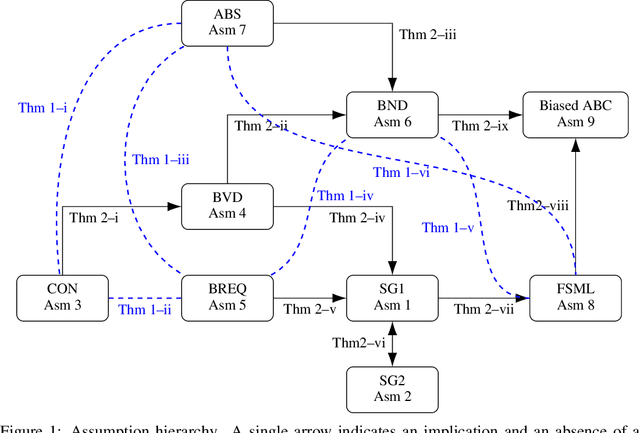

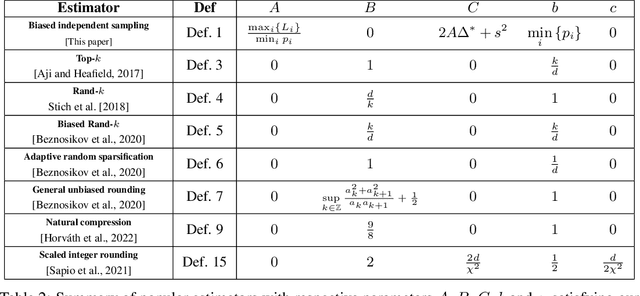

Abstract:Stochastic Gradient Descent (SGD) is arguably the most important single algorithm in modern machine learning. Although SGD with unbiased gradient estimators has been studied extensively over at least half a century, SGD variants relying on biased estimators are rare. Nevertheless, there has been an increased interest in this topic in recent years. However, existing literature on SGD with biased estimators (BiasedSGD) lacks coherence since each new paper relies on a different set of assumptions, without any clear understanding of how they are connected, which may lead to confusion. We address this gap by establishing connections among the existing assumptions, and presenting a comprehensive map of the underlying relationships. Additionally, we introduce a new set of assumptions that is provably weaker than all previous assumptions, and use it to present a thorough analysis of BiasedSGD in both convex and non-convex settings, offering advantages over previous results. We also provide examples where biased estimators outperform their unbiased counterparts or where unbiased versions are simply not available. Finally, we demonstrate the effectiveness of our framework through experimental results that validate our theoretical findings.
 Add to Chrome
Add to Chrome Add to Firefox
Add to Firefox Add to Edge
Add to Edge